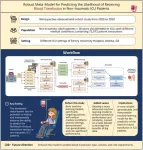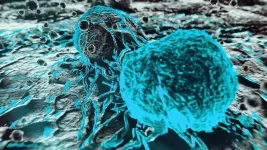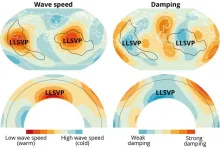(Press-News.org) SAN ANTONIO, Jan. 22, 2025 – Females have a 31% higher associated risk of developing long COVID, with women aged 40 to 55 years having the highest propensity, according to a study led by The University of Texas Health Science Center at San Antonio (UT Health San Antonio) funded by the National Institutes of Health.
The findings are part of a nationwide initiative launched by NIH, called Researching COVID to Enhance Recovery, or RECOVER, to understand the long-term health effects of COVID-19.
The latest study followed 12,276 participants over time to identify the risk of developing long COVID, and found females with a “risk ratio” of 1.31 compared with males, equating to 31% higher associated risk – even when considering factors like race, ethnicity, COVID variant, severity of COVID infection and other non-medical social factors that affect health.
The risk among females for developing long COVID was dependent on age, pregnancy and menopausal status.
“These findings show that patients and health care teams should consider the differences in long COVID risk as it relates to sex assigned at birth,” said Dimpy Shah, MD, PhD, assistant professor of population health sciences with the Joe R. and Teresa Lozano Long School of Medicine at UT Health San Antonio. “Understanding these differences can help us recognize and treat patients with long COVID more effectively.”
Shah is corresponding author of the study, titled, “Sex Differences in Long COVID,” published Jan. 22, 2025, in JAMA Network Open.
“This important study from the RECOVER cohort identifies risk factors for long COVID that are critical in providing insights for prevention and treatment of this often debilitating disease,” said Thomas Patterson, MD, MACP, professor of medicine and chief of the Division of Infectious Diseases with the Long School of Medicine at UT Health San Antonio, and principal investigator for PREVAIL South Texas, the UT Health San Antonio RECOVER hub.
Largest cohort study for long COVID
Worldwide, SARS-CoV-2, a strain of coronavirus that causes COVID-19, has infected more than 700 million people, with an estimated 7 million deaths, the study notes. Although many individuals recover from acute COVID-19, a substantial portion experience long-term effects, called long COVID, or post-COVID condition.
Other post-viral and autoimmune conditions have a female predominance, but whether the same is true for long COVID, especially within different subgroups, has been uncertain.
Numerous studies had shown that males have more severe acute COVID-19 cases and higher mortality than females. However, emerging literature suggested that females may be at greater risk for new and persisting symptoms following initial infection.
Studies had yet to fully account for factors that may distort the true estimate of biological sex-related risk – like age, menstrual status, comorbidities, vaccination status, variants of concern, severity of acute illness and differential engagement in health care. Some studies relied upon relatively small sample sizes or those lacking ethnic or racial diversity.
The RECOVER researchers set out to evaluate sex differences in the risk of developing long COVID among adults with SARS-CoV-2 infections, accounting for distorting factors and representing the largest cohort to date followed up in a natural history study of long COVID. The cohort study used data from the NIH RECOVER-Adult cohort, consisting of individuals enrolled in and prospectively followed up at 83 sites in 33 states, Washington, D.C., and Puerto Rico.
Data was examined from participants enrolled from Oct. 29, 2021, to July 5, 2024, who had a qualifying study visit 6 months or more after their initial COVID-19 infection. Gender was defined as self-reported sex assigned at birth.
The scientists measured development of long COVID using a self-reported symptom-based questionnaire and scoring guideline at the first study visit. They used propensity score matching to estimate risk ratios and risk differences. The full model included demographic and clinical characteristics, and social determinants of health, with a reduced model including only age, race and ethnicity.
The full model found the 31% higher risk for females, with a mean age of infection at 46 years. Among participants aged 40 to 54 years, the risk was even higher – at 42% higher in menopausal participants and 45% higher in non-menopausal female participants, compared with male participants.
“This study gives us new knowledge and builds on other studies that also looked at sex assigned at birth and long COVID,” Shah said. “Because of the size of the RECOVER study and the diversity of participants, we had a special opportunity to look at sex assigned at birth while also considering things like vaccination status, autoimmune disease, diabetes, BMI and COVID variant.
“We hope this encourages other researchers to explore why there are differences in the risk of developing long COVID based on your assigned sex at birth,” she said.
Other researchers in the study also are with the Long School at UT Health San Antonio, as well as Massachusetts General Hospital Biostatistics; Harvard Medical School; Brigham and Women’s Hospital; Stanford University; Intermountain Health; Beth Israel Deaconess Medical Center; Icahn School of Medicine at Mount Sinai; Columbia University; RECOVER Patient, Caregiver or Community Representative, New York; University of Illinois Chicago; University of Alabama at Birmingham; NYU; University of Arizona; University of Utah Health; Emory University; University of Utah; Stony Brook University; Howard University; Cedars-Sinai Medical Center; and The George Washington University.
Also, University of California San Francisco; University of Colorado-Anschutz Medical Campus; Tulane University Health Sciences Center; Kaiser Permanente of Georgia; Centre College; West Virginia University; Banner Health; Case Western Reserve University; MaineHealth Institute for Research; The University of Texas Medical Branch-Galveston; Providence Inland Northwest Health; Swedish Health Services; University of Chicago; and MetroHealth Medical Center.
To learn more, go to the Publications Page on RECOVERcovid.org.
UT Health San Antonio is a world-class research university, ranking at the top 5% among institutions globally for clinical medicine according to U.S. News & World Report. It is No. 12 in the world among universities for the impact of its discoveries – in normalized citation impact, which compares the number of citations its research receives per paper to the average for similar published work, a recognized core measure of research impact.
Sex Differences in Long Covid
Dimpy P. Shah, Tanayott Thaweethai, Elizabeth W. Karlson, Hector Bonilla, Benjamin D. Horne, Janet M. Mullington, Juan P. Wisnivesky, Mady Hornig, Daniel J. Shinnick, Johathan D. Klein, Nathaniel B. Erdmann, Shari B. Brosnahan, Joyce K. Lee-Iannotti, Torri D. Metz, Christine Maughan, Ighovwerha Ofotokun, Harrison T. Reeder, Lauren E. Stiles, Aasma Shaukat, Rachel Hess, Hassan Ashktorab, Logan Bartram, Ingrid V. Bassett, Jacqueline H. Becker, Hassan Brim, Alexander W. Charney, Tananshi Chopra, Rececca G. Clifton, Steven G. Deeks, Kristine M. Erlandson, Daniel S. Fierer, Valerie J. Flaherman, Vivian Fonseca, Jennifer C. Gander, Sally L. Hodder, Vanessa L. Jacoby, Pavitra Kotini-Shah, Jerry A. Krishnan, Andre Kumar, Bruce D. Levy, David Lieberman, Jenny J. Lin, Jeffrey N. Martin, Grace A. McComsey. Talal Moukabary, Megumi J. Okumura, Michael J. Peluso, Clifford J. Rosen, George Saade, Pankil K. Shah, Zaki A. Sherif, Barbara S. Taylor, Katherine R. Tuttle, Alfredo E. Urdaneta, Julie A. Wallik, Zanthia Wiley, David Zhang, Leora I. Horwitz, Andrea S. Foulkes, Nora G. Singer, for the RECOVER Consortium
First published: Jan. 22, 2025, JAMA Network Open
Link to full study: https://jamanetwork.com/article.aspx?doi=10.1001/jamanetworkopen.2024.55430&utm_campaign=articlePDF%26utm_medium=articlePDFlink%26utm_source=articlePDF%26utm_content=jamanetworkopen.2024.55430
The University of Texas Health Science Center at San Antonio (UT Health San Antonio), a primary driver of San Antonio’s $44.1 billion health care and biosciences sector, is the largest academic research institution in South Texas with an annual research portfolio of $413 million. Driving substantial economic impact with its six professional schools, a diverse workforce of more than 8,500, an annual expense budget of $1.46 billion and clinical practices that provide 2.6 million patient visits each year, UT Health San Antonio plans to add more than 1,500 higher-wage jobs over the next five years to serve San Antonio, Bexar County and South Texas. To learn about the many ways “We make lives better®,” visit UTHealthSA.org.
The UT Health San Antonio Joe R. and Teresa Lozano Long School of Medicine is listed among U.S. News & World Report’s best medical schools, ranking in the top 30% nationwide for research. To learn more, visit https://uthscsa.edu/medicine/.
Stay connected with The University of Texas Health Science Center at San Antonio on Facebook, Twitter, LinkedIn, Instagram and YouTube.
END
Females have a 31% higher associated risk of developing long COVID, UT Health San Antonio-led RECOVER study shows
Women aged 40 to 55 years have highest risk
2025-01-22
ELSE PRESS RELEASES FROM THIS DATE:
Final synthetic yeast chromosome unlocks new era in biotechnology
2025-01-22
Macquarie University researchers have worked with an international team of scientists to achieve a major milestone in synthetic biology by completing the creation of the final chromosome in the world's first synthetic yeast genome.
This achievement represents the completion of the global Sc2.0 project to create the world's first synthetic eukaryotic genome from Saccharomyces cerevisiae (baker's yeast) and a new-to-nature tRNA neochromosome.
Using cutting-edge genome-editing techniques, including the CRISPR D-BUGS protocol, the team identified and corrected genetic errors that impacted yeast growth. These changes restored the strain’s ability to grow on glycerol, ...
AI-powered prediction model enhances blood transfusion decision-making in ICU patients
2025-01-22
Researchers at Emory University have developed a groundbreaking artificial intelligence (AI) model capable of accurately predicting the likelihood of blood transfusion in non-traumatic intensive care unit (ICU) patients. Published in Health Data Science, the study addresses longstanding challenges in predicting transfusion needs across diverse patient groups with varying medical conditions.
Blood transfusions are critical in managing anemia and coagulopathy in ICU settings, yet current clinical decision support systems often ...
MD Anderson Research Highlights for January 22, 2025
2025-01-22
HOUSTON ― The University of Texas MD Anderson Cancer Center’s Research Highlights showcases the latest breakthroughs in cancer care, research and prevention. These advances are made possible through seamless collaboration between MD Anderson’s world-leading clinicians and scientists, bringing discoveries from the lab to the clinic and back.
Novel allogeneic NK cell therapy from induced pluripotent stem cells shows encouraging efficacy in relapsed or refractory B-cell lymphoma patients
Patients ...
Scholastica announces integration with Crossmark by Crossref to expand its research integrity support
2025-01-22
CHICAGO, IL (January 22, 2025) — Scholastica, a leading software solutions provider for academic journals, has released a new integration with Crossmark by Crossref, the industry standard mechanism for reporting updates to published research.
The Crossmark integration is now available to journals subscribed to the Scholastica Open Access Publishing Platform that are published by a Crossref member organization participating in the Crossmark service.
“Clearly communicating article updates and retractions is critical to maintaining the integrity of the scholarly record, and with this ...
Could brain aging be mom’s fault? The X chromosome factor
2025-01-22
Women are born with two X chromosomes and inherit one from each parent. But in every cell of their body, just one X chromosome is needed – so the other is randomly inactivated. Some cells use only a maternal X chromosome; others rely only on the paternal X.
Now, UC San Francisco researchers have found that when the brain cells of female mice express only a maternal X chromosome, their memory and cognitive skills deteriorate faster than female mice that express both maternal and paternal X chromosomes.
The discovery, which appears Jan. 22 in Nature, could explain the variation in brain aging between the sexes, since males inherit only a maternal X, as ...
Subterranean ‘islands’: strongholds in a potentially less turbulent world
2025-01-22
Deeply hidden in Earth’s mantle there are two huge ‘islands’ with the size of a continent. New research from Utrecht University shows that these regions are not only hotter than the surrounding graveyard of cold sunken tectonic plates, but also that they must be ancient: at least half a billion years old, perhaps even older. These observations contradict the idea of a well-mixed and fast flowing Earth’s mantle, a theory that is becoming more and more questioned. “There is less flow in Earth’s ...
Complete recombination map of the human-genome, a major step in genetics
2025-01-22
Complete recombination map of the human genome, a major step in genetics
Scientists at deCODE genetics/Amgen have constructed a complete map of how human DNA is mixed as it is passed down during reproduction. The map marks a major step in the understanding of genetic diversity and its impact on health and fertility. It continues 25 years of research at deCODE genetics into how new diversity is generated in the human genome, and its relationship to health and disease.
The new map, appearing today in the online edition of Nature, is the first to incorporate shorter-scale shuffling, ...
Fighting experience plays key role in brain chemical’s control of male aggression
2025-01-22
Like humans, mice will compete over territory and mates, and show increased confidence in their fighting skills the more they win. At first, a brain chemical called dopamine is essential for young males to master this behavior. But as they gain experience, the chemical grows less important in promoting aggression, a new study shows.
Dopamine has been linked to male aggression for decades. How past experiences might influence this relationship, however, had until now been unclear.
In experiments in rodents, a team led by researchers at NYU Langone Health boosted activity in dopamine-releasing cells in a part of the brain called the ventral tegmental area. The findings revealed that in ...
Trends in preventive aspirin use by atherosclerotic cardiovascular risk
2025-01-22
About The Study: Following landmark clinical trials and changes in guideline recommendations, self-reported primary prevention aspirin use decreased among older adults and adults with low atherosclerotic cardiovascular disease (ASCVD) risk for whom aspirin was not recommended, but also decreased among adults with higher ASCVD risk for whom aspirin may still be recommended. Despite these reductions, many patients with limited likelihood to benefit reported continuing to take aspirin.
Corresponding Author: To contact the ...
Sex differences in long COVID
2025-01-22
About The Study: This study found that female sex was associated with an increased risk of long COVID compared with male sex, and this association was age, pregnancy, and menopausal status dependent. These findings highlight the need to identify biological mechanisms contributing to sex specificity to facilitate risk stratification, targeted drug development, and improved management of long COVID.
Corresponding author: To contact the corresponding author, Dimpy P. Shah, M.D., Ph.D., email ShahDP@uthscsa.edu.
To ...
LAST 30 PRESS RELEASES:
Invisible battery parts finally seen with pioneering technique
Tropical forests generate rainfall worth billions, study finds
A yeast enzyme helps human cells overcome mitochondrial defects
Bacteria frozen in ancient underground ice cave found to be resistant against 10 modern antibiotics
Rhododendron-derived drugs now made by bacteria
Admissions for child maltreatment decreased during first phase of COVID-19 pandemic, but ICU admissions increased later
Power in motion: transforming energy harvesting with gyroscopes
Ketamine high NOT related to treatment success for people with alcohol problems, study finds
1 in 6 Medicare beneficiaries depend on telehealth for key medical care
Maps can encourage home radon testing in the right settings
Exploring the link between hearing loss and cognitive decline
Machine learning tool can predict serious transplant complications months earlier
Prevalence of over-the-counter and prescription medication use in the US
US child mental health care need, unmet needs, and difficulty accessing services
Incidental rotator cuff abnormalities on magnetic resonance imaging
Sensing local fibers in pancreatic tumors, cancer cells ‘choose’ to either grow or tolerate treatment
Barriers to mental health care leave many children behind, new data cautions
Cancer and inflammation: immunologic interplay, translational advances, and clinical strategies
Bioactive polyphenolic compounds and in vitro anti-degenerative property-based pharmacological propensities of some promising germplasms of Amaranthus hypochondriacus L.
AI-powered companionship: PolyU interfaculty scholar harnesses music and empathetic speech in robots to combat loneliness
Antarctica sits above Earth’s strongest “gravity hole.” Now we know how it got that way
Haircare products made with botanicals protects strands, adds shine
Enhanced pulmonary nodule detection and classification using artificial intelligence on LIDC-IDRI data
Using NBA, study finds that pay differences among top performers can erode cooperation
Korea University, Stanford University, and IESGA launch Water Sustainability Index to combat ESG greenwashing
Molecular glue discovery: large scale instead of lucky strike
Insulin resistance predictor highlights cancer connection
Explaining next-generation solar cells
Slippery ions create a smoother path to blue energy
Magnetic resonance imaging opens the door to better treatments for underdiagnosed atypical Parkinsonisms
[Press-News.org] Females have a 31% higher associated risk of developing long COVID, UT Health San Antonio-led RECOVER study showsWomen aged 40 to 55 years have highest risk



